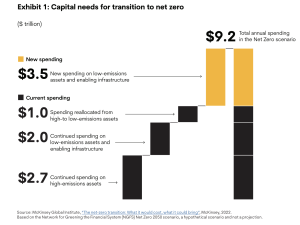This includes the technological know-how that is believed to be “pivotal” in developing and funding innovations to support net zero transition
A new report jointly produced by McKinsey & Company, Elevandi and the Monetary Authority of Singapore (MAS) reveals that fintech companies could play a significant role in helping to mobilise the capital required to create global sustainability, particularly in the effort towards decarbonisation (net zero).
“Fintech could play a significant role in helping to mobilise the capital required to create global sustainability. So far, only a very small portion of the total need is covered through financing. In recent years financing for projects targeting reduced emissions grew, but remained well short of the total needs,” the report states.
There are several ways that fintech companies can contribute to the move towards net zero. This includes the companies’ technological know-how that is believed to be “pivotal” in developing and funding innovations related to carbon capture or the protection of natural resources.
Fintech companies can also play the role of educators in educating clients on the implications of the climate transition for their businesses and helping them move forward.
The report lists specific activities in the fintech industry’s effort to support sustainability which encompasses six identifiable themes:
Sustainable everyday banking
Products and services that match customers’ environmental values, such as rewards for responsible shopping.
Impact fundraising
Raising funds for environmental and social causes.
ESG intelligence and analytics
Sustainability-related data and analytics, ESG ratings and research services.
Impact investing and retirement
Opportunities that generate social and environmental impact along with financial returns.
Green and accessible financing
Financing for sustainability projects and providing credit access to underserved groups.
Carbon tracking and offsetting
Tracking individual and corporate carbon footprints based on financial transactions and identifying ways to offset them.
What blockchain can do
As one of the most talked-about subjects in the tech industry today, naturally one would be curious about the role that blockchain can play in meeting net zero goals. According to the report, blockchain can play a significant role in the matter of deconstructing and securing data.
“Given that ESG data is fundamental to sustainability investment and lending decisions, there must be a way to deconstruct the data and verify its integrity. Otherwise, decisions based on this data have the risk of being illinformed and companies remain open to accusations of greenwashing. Blockchain technology could address this challenge,” it explains.
But this technology is not without criticism. Cryptocurrencies, as the most popular implementation of blockchain technology today, are known for their massive electricity use and eventual environmental impact.
There have been several initiatives to help reduce the environmental impact of cryptocurrencies, such as through “The Merge” for Ethereum. The switch saw the cryptocurrency moving to a new algorithm Proof of Stake which is said to reduce power consumption by almost 100 per cent.
Apart from that, AI and machine learning are also the technologies that have been named to help in the process of vouching for the validity of data. “They could seek out and identify data abnormalities that could call into doubt the sustainability claims of particular instruments,” the report says.
Moving towards net zero
The report stressed that in our effort to transition towards decarbonisation (net zero), by 2050, the global economy will require “the greatest reallocation of capital since World War II coupled with a massive influx of financial innovation.” But as stated earlier, to date, financial mobilisation towards the goal still leaves much to be desired.
“In its January 2022 report, the McKinsey Global Institute (MGI) calculated that capital spending needed for the transition would total US$275 trillion between 2026 and 2050 or about US$9.2 trillion a year … The need represents
an average increase in annual spending of about US$3.5 trillion or, for illustration, an amount equal to about half the annual global corporate profits,” the report elaborates.
The details are described in the following illustration:

There are also other factors that make the prospect seem darker when it comes to fulfilling net zero goals, at least temporarily. This includes the COVID-19 pandemic and other recent global crises which may force investors to take the safer, more careful approach when it comes to investing.
” … the geopolitical shocks of 2022 might tempt many to set aside sustainability goals at least temporarily in favour of tried-and-true fossil fuel-based operations, for example stopping or delaying investment in renewable energy sources. This might especially be true for the manufacturing, transportation, and energy sectors,” the report states.
However, it highlights that this approach might be a “false trade-off.”
“Companies can be flexible and maintain a long-term focus on sustainability while creating the necessary resilience to withstand shocks. Indeed, continued efforts toward sustainability can build energy independence and add substantially to resilience,” it stresses.
In order to reach the goals of decarbonisation through this dual-focus approach, companies are encouraged to explore materials transition and other green business approaches early to secure access to the most promising innovations, according to the report.
It stated that while the risks may be significantly higher for first-movers in the field, the rewards are also said to be “proportionally higher”.
“For example, early investors can benefit from policy incentives, skilled talent attracted to cutting-edge employers, partners who are equally willing to explore the potential, and securing a place in emerging value chains,” the report stresses.
Source: e27










